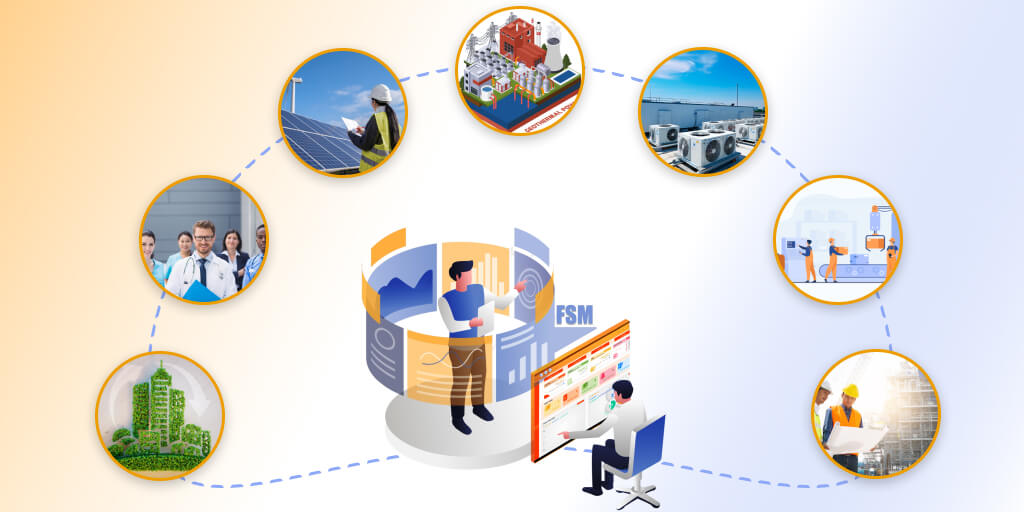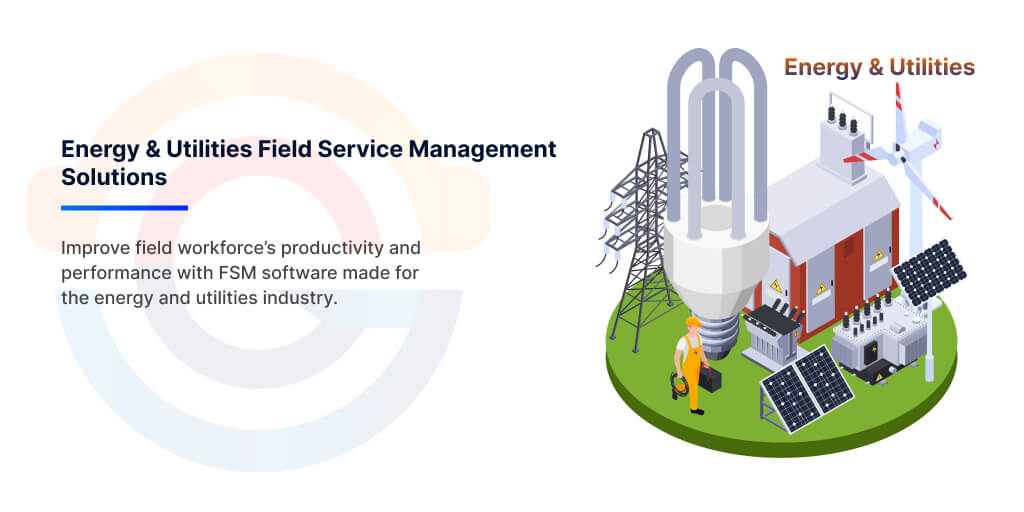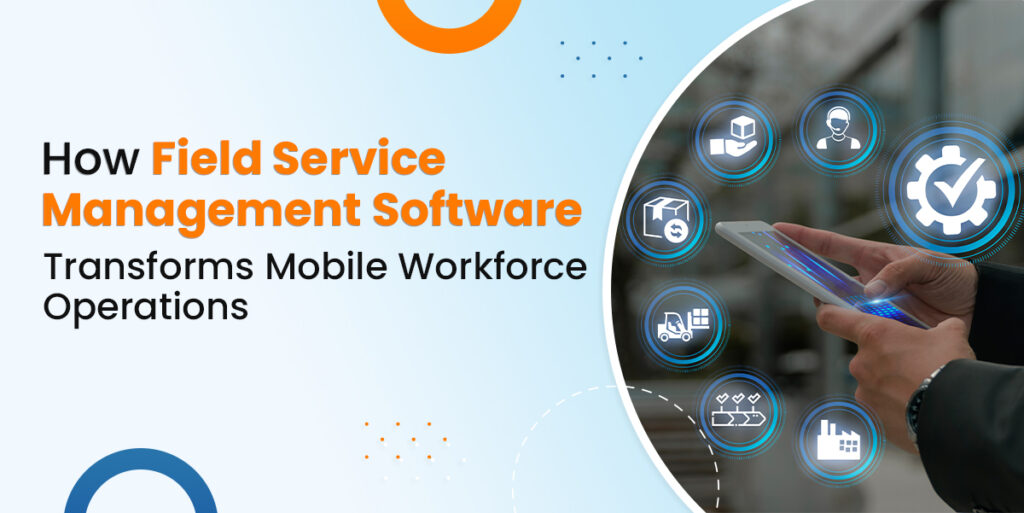In today’s fast-paced technological landscape, the energy and utilities sector finds itself at a pivotal junction. As we observe the shifting paradigms of consumption and distribution, the need for a more digitalized and intelligent infrastructure and utility field service software becomes clear. Let’s embark on a journey to understand how digital solutions, especially field management software, are revolutionizing the way we manage energy.
Evolution of Metering Solutions
- Manual Measurements
In earlier days, utility companies relied heavily on manual meter readings. Technicians physically visited consumer premises to record measurements. This approach had its set of challenges. Not only was it labour-intensive, but it also gave room for errors. Often, logistics became a headache, and the entire process was riddled with inefficiencies.
- Metering with Wireless Technologies
With the advent of wireless technologies, a ray of change appeared on the horizon. Devices equipped with radio and GSM capabilities enabled remote data collection through the “drive-by” method. While this was a significant step forward, it wasn’t the ultimate solution. Technicians still needed to be in the vicinity, and continuous access to up-to-date information remained elusive.
- Remote Data Measurement – Smart Metering
And then, a new era dawned. The era of smart metering. Now, utility companies can remotely access user data around the clock. Gone were the days when physical staff presence was a mandate for readings. With modern energy tracking software, data transfer has become automatic. The meters relayed information directly to the central systems. This transformation ensured that data from vast distances could be transmitted seamlessly. Consequently, leaks, anomalies, and potential security breaches could be identified promptly, making the energy ecosystem safer and more efficient.
What are Smart Meters?
Smart meters are cutting-edge devices equipped to read utility meters remotely. They are not just confined to electricity readings. They span across utilities such as water, gas, and heating. The beauty of these meters lies in their ability to communicate. Energy & utility field service software can converse not only with each other but also with utilities and suppliers. Such interconnectedness paves the way for real-time insights and enhanced service delivery.
- Beyond Electricity
Originally, the focus was solely on electricity meters. But with innovation at the helm, the scope expanded. Now, smart meters cater to a wide array of utilities, bridging the gap between conventional metering and the digital age.
- The IoT Connection
The prowess of smart meters gets amplified when we talk about the Internet of Things (IoT). Imagine a world where every device, every utility, communicates, and shares data. That’s IoT for you. Smart meters, acting as pivotal nodes in this vast network, contribute significantly to a more informed and efficient energy management system.
Advanced Communications Infrastructure (AMI)
One cannot discuss smart meters without touching upon the Advanced Communications Infrastructure or AMI. It stands as a testament to the strides technology has made in the field of energy.
- An Overview
AMI isn’t just about smart meters. It’s an intricate blend of meters, data networks, and other cutting-edge tech. This combination allows energy management system software to measure, manage, and most importantly, report on electricity consumption. The two-way communication system, paired with a robust data management framework, transforms the way energy is perceived and utilized.
- Benefits Galore
On a macro scale, AMI is the backbone of a future-ready energy grid. As energy traverses through power lines, smart meters receive and send back crucial data. This interplay ensures that energy needs are met efficiently and swiftly. In case of interruptions, alternate pathways can be identified to ensure continuous supply.
On the individual front, consumers stand to gain immensely. Armed with detailed insights into their energy consumption patterns, they can make informed decisions. Simple adjustments can lead to substantial savings and a reduced carbon footprint.
The Role of Utility Field Service Management Software

With the introduction of advanced metering solutions and the rising demand for energy efficiency, the spotlight is now on energy analysis software. This software plays a pivotal role in reshaping our approach to energy management.
- The Basics
At its core, energy management software provides a detailed overview of energy consumption patterns. It analyses data, often in real-time, offering valuable insights into the intricacies of energy use. For businesses and homeowners alike, this translates to opportunities for better decision-making and improved energy efficiency.
- Energy Gauge and its Importance
A prominent example in the realm of energy analysis is Energy Gauge. This software has carved a niche for itself by assisting experts in their endeavours. Before undertaking any installation or modification, Energy Gauge offers a comprehensive cost/benefit analysis. Such insights empower users to make well-informed choices, ensuring that investments in energy solutions yield the maximum benefits.
- Reducing Energy Consumption
One might wonder about the tangible impacts of such software. Take, for instance, movement-activated air conditioning systems. These systems, while innovative, can lead to heightened energy consumption. Energy tracking software can offer insights into these patterns, guiding users on optimizing usage and thereby, conserving energy.
Real-World Applications
- Enhancing HVAC Systems
HVAC systems, integral to modern infrastructures, can sometimes be energy guzzlers. By integrating an energy management platform, technicians and homeowners can detect inefficiencies. Identifying areas that need fine-tuning or understanding the best operational hours can lead to significant energy and cost savings.
- Green Building Projects
Today, there’s a surge in the demand for green buildings. These structures prioritize sustainability, and energy analysis software is their stalwart companion. By analysing energy usage patterns, architects and engineers can design buildings that align with eco-friendly standards.
- Industrial Settings
In industrial arenas, the stakes are high. A minor inefficiency can translate to substantial financial implications. Here, energy analysis software steps in as a trusted ally. It provides detailed insights into machinery performance, ensuring that energy consumption remains at optimal levels.
Read More – Field Management Software
The Interplay of Field Service Management Software and Smart Meters
It’s intriguing to observe the synergy between utility field service software and smart meters. Together, they’re changing the energy landscape.
- Data Gathering: Smart meters act as the data collection hubs. By gauging real-time energy consumption, they offer a treasure trove of information. This data, when fed into software, undergoes thorough examination, leading to actionable insights.
- Enhanced Consumer Experience: For consumers, this partnership means empowerment. With data-driven insights at their fingertips, they can make well-informed energy choices. Whether it’s about adjusting their HVAC settings or optimizing the operation of heavy machinery, data guides the way.
- Utility Companies’ Perspective: From the vantage point of utility companies, the amalgamation of smart meters and utility field service software is a boon. They can now offer tailored solutions to consumers, foster trust, and ensure service delivery that’s both efficient and consistent.
Future Prospects and Potential
- Integration with Artificial Intelligence: Imagine utility field service software equipped with artificial intelligence. Such a setup would not only analyse data but also predict future consumption patterns. This predictive analysis could revolutionize energy management, ushering in unparalleled efficiency.
- Personalized Energy Solutions: In the future, energy solutions will be tailor-made. Drawing insights from software, businesses, and homeowners will enjoy solutions that resonate with their unique needs and preferences.
- Strengthening the Renewable Energy Sector: As the world tilts towards renewable energy, energy-tracking software will play a decisive role. It will aid in optimizing the output of renewable sources, ensuring that green energy solutions are both viable and efficient.
Related Article:
5 Reasons Why Time Tracking Software is a Must-Have for Field Workforce









